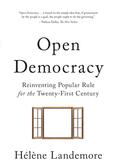
Open Democracy describes a new model of democracy that opens up power to ordinary citizens could strengthen inclusiveness, responsiveness, and accountability in modern societies
To the ancient Greeks, democracy meant gathering in public and debating laws set by a randomly selected assembly of several hundred citizens. To the Icelandic Vikings, democracy meant meeting every summer in a field to discuss issues until consensus was reached. Our contemporary representative democracies are very different. Modern parliaments are gated and guarded, and it seems as if only certain people - with the right suit, accent, wealth, and connections - are welcome. Diagnosing what is wrong with representative government and aiming to recover some of the lost openness of ancient democracies, Open Democracy presents a new paradigm of democracy in which power is genuinely accessible to ordinary citizens.
Hélène Landemore favors the ideal of “representing and being represented in turn” over direct-democracy approaches. Supporting a fresh nonelectoral under-standing of democratic representation, Landemore recommends centering political institutions around the “open mini-public” — a large, jury-like body of randomly selected citizens gathered to define laws and policies for the polity, in connection with the larger public. She also defends five institutional principles as the foundations of an open democracy: participatory rights, deliberation, the majoritarian principle, democratic representation, and transparency. Open Democracy demonstrates that placing ordinary citizens, rather than elites, at the heart of democratic power is not only the true meaning of a government of, by, and for the people, but also feasible and, today more than ever, urgently needed.
Praise for Open Democracy
“ In this provocative and masterful book, Landemore’s surprising answer to the crisis of democracy is more democracy. Since the threat to democracy is rule by untrustworthy elected leaders, Landemore proposes establishing—through random selection processes—bodies of ordinary citizens to govern and engage in policymaking, which banks on the sensibility of collective public opinion and the diversity of a nation’s citizenry. Ambitious and important, Open Democ-racy brings together the richness of democratic theory and relevant examples in a most engaging way.”
—Robert Y. Shapiro, Columbia University
“ Indispensable and inspiring, Open Democracy provides a penetrating critique of the failures of electoral representation and an in-depth exploration of the dem-ocratic innovations invented or brought to fruition in the last decade to combat these failures. Anyone frustrated with the workings of democracy should read this book.”
—Jane Mansbridge, Harvard University
“ Engaging a wide range of contemporary literature and prominent debates, Open Democracy makes an important and truly original contribution to demo-cratic theory and practice. Landemore presents a new and radical view of the direction we should be headed in reforming, renovating, and rethinking our democratic institutions.”
—Simone Chambers, University of California, Irvine
This publication is available on the following site(s):